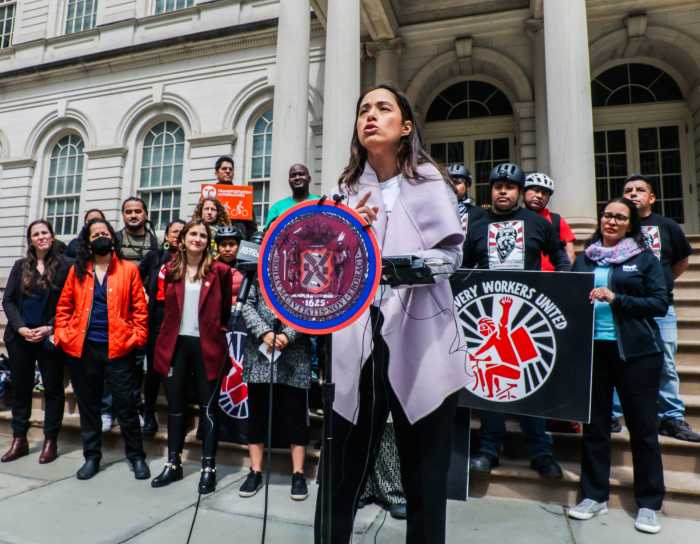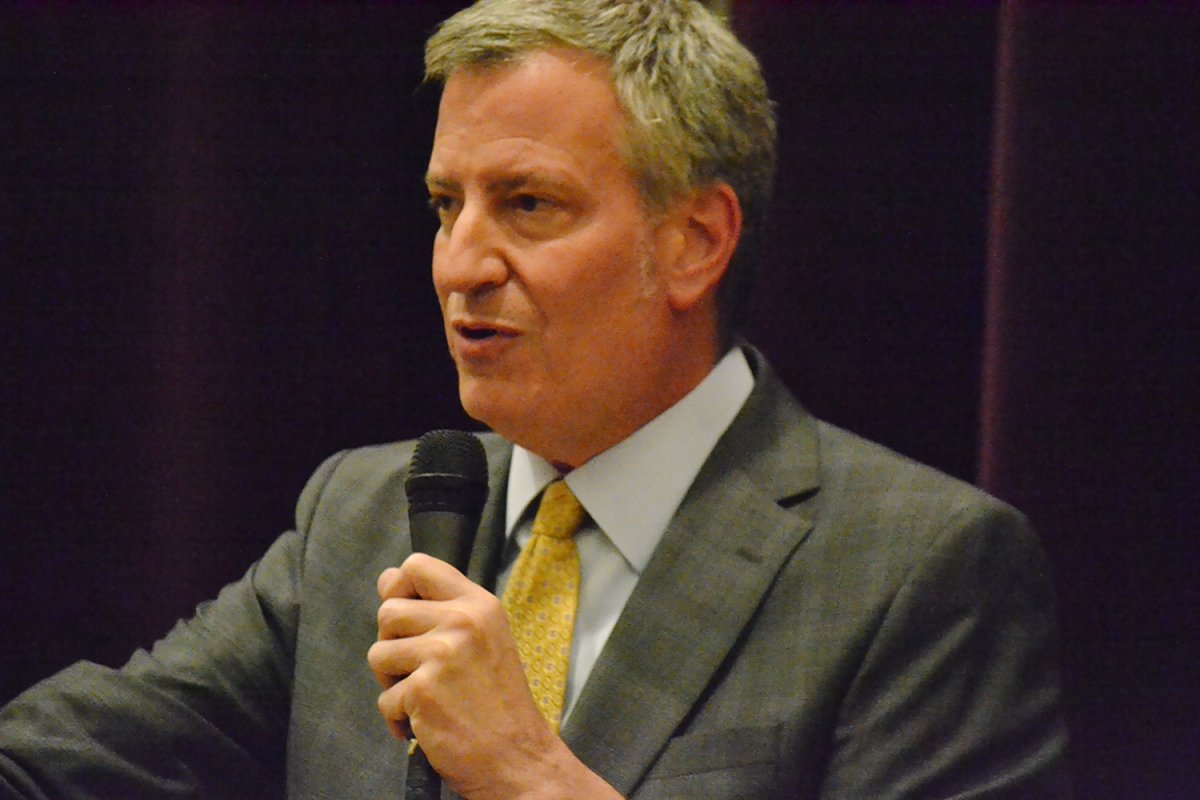
BY LINCOLN ANDERSON | It’s not every day that a sitting New York City mayor comes to a local Democratic political club seeking its endorsement. But Mayor Bill de Blasio swung by the Village Independent Democrats’ candidates night at the L.G.B.T. Center on W. 13th St. Tuesday, where he made his case for why he deserves election to a second term.
During the question-and-answer period, however, de Blasio came under fire from advocates from the Elizabeth St. Garden, who repeatedly peppered him with questions about why he won’t accept the community’s alternative plan that would save the besieged Little Italy / Soho green oasis by shifting a planned senior housing project to a vacant site at Hudson and Clarkson Sts.
Yet, as he did in March at a town hall meeting in Chelsea, the mayor was unbending. He said he felt the current plan for the garden lot — which would only preserve one-quarter of the open space — was the best option, and that creating affordable housing is the city’s topmost priority.
During his allotted three minutes for his opening remarks, de Blasio said the city has changed for the better since the tenures of his predecessors, Mayors Mike Bloomberg and Rudy Giuliani.
“For 20 years, we had Republicans, independents — whatever you call them — that did not reflect the values of the clubs in this room,” de Blasio noted.
(Although V.I.D. took the lead on the event, it was also co-sponsored by five other local political outfits, including Jim Owles Liberal Democratic Club, Village Reform Democratic Club, Downtown Independent Democrats, Chelsea Reform Democratic Club and Coalition for a District Alternative.)
Stop-and-frisks are down by 93 percent over the past three years, but so is crime, the mayor said.
“And we are going to continue and deepen it,” he said of tactics to retrain police and reduce crime.
All children now have access to pre-K — “and someday soon there’ll be ‘3-K’ for all,” he said, referring to preschool for 3-year-olds.
“There’s a different kind of Rent Guidelines Board that’s making a different kind of decision,” he noted of the rent freeze for rent-regulated tenants the past two years.
For decades, he added, the assumption was that tenants “were at a disadvantage” versus landlords, but that has now changed, too.
“In the last three years, we’ve upended a lot of the status quo,” the mayor stated. “We’ve changed the rules of the game.”
But during the ensuing Q&A, he was barraged by questions about the Elizabeth St. Garden, plus on Rivington House and “Broken Windows” policing policy.
“It looks like listening to the community is what you say you do — but you’re not listening to the community on Elizabeth St. Garden,” accused District Leader Keen Berger.
De Blasio replied, “There’s no greater need for affordable housing than for seniors.”
“I’m a senior and I don’t want it!” Nolita activist Marna Lawrence shouted out. “You made that decision — not the community. We need our open spaces, too!”
“There’s an alternative site,” veteran V.I.D. member Frieda Bradlow pointed out.
But de Blasio wasn’t having it.
“I’m sorry. The number one issue in the city is affordable housing,” he stated. “There’s a vast crisis. There’s a hell of a lot of people in the city who think that should be our number one priority.
“We struck a balance in keeping some public space,” he added, referring to the current plan for Elizabeth St. that would preserve 5,000 square feet of open space.
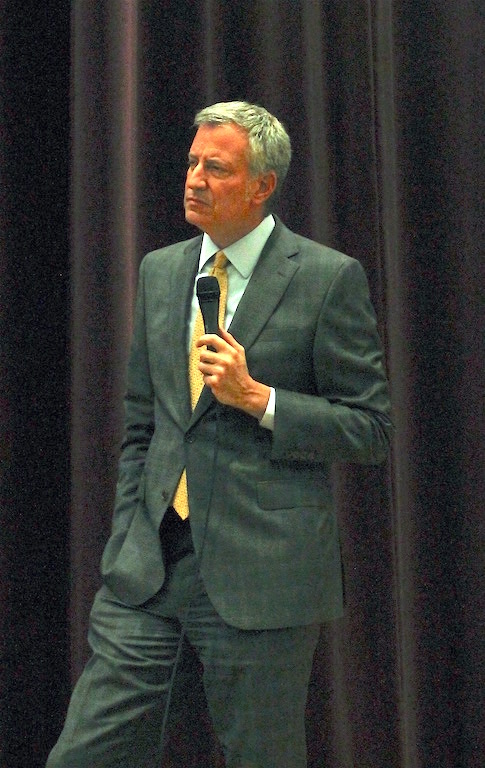
The only politicians who support the housing project on the garden site are de Blasio and Councilmember Margaret Chin.
David Gruber, a former chairperson of Community Board 2, noted that City Hall had agreed to move a project slated for a site in W. 20th St. in Chelsea, so that a park could be built there. Why couldn’t the same thing be done with Elizabeth St. since an alternative site has been found that would allow much more affordable housing to be built? he asked.
Soho activist Lora Tenenbaum noted that after 9/11, the importance of clean air became crucial to Downtowners. The garden provides that, she noted.
“We need air,” she stressed. “We need green space.”
De Blasio reiterated, “The focal point of this administration has been affordable housing.”
One woman in the audience — who had been asking tough questions of the candidates all night — indignantly chimed in, “But you destroyed units on E. 11th St. to create a Marriott!”
The mayor said he wasn’t familiar with what she was referring to.
“I’ve had enough!” the woman declared, and stormed out of the meeting.
Of course, she was referring to the project on E. 11th St. across from Webster Hall, where Marriott is replacing several historic brick row houses with a so-called “affordable chic” Moxy Hotel, geared toward the “millennial traveler.”
Earlier, the same woman had asked de Blasio a question, presumably partly inspired by Rivington House, the former Lower East Side AIDS hospice that was allowed to be secretly sold off for private development, despite deed restrictions for use as a nonprofit medical facility.
“When are you going to stop selling public assets and turning them into luxury developments — like that thing across the street?” she said, in this case, referring to the Rudin Management market-rate development going up on the former St. Vincent’s Hospital site.
De Blasio said it’s really a question of the city’s bottom line, noting, “We do not have the public resources that we used to have in the past. I’m looking at results case by case.”
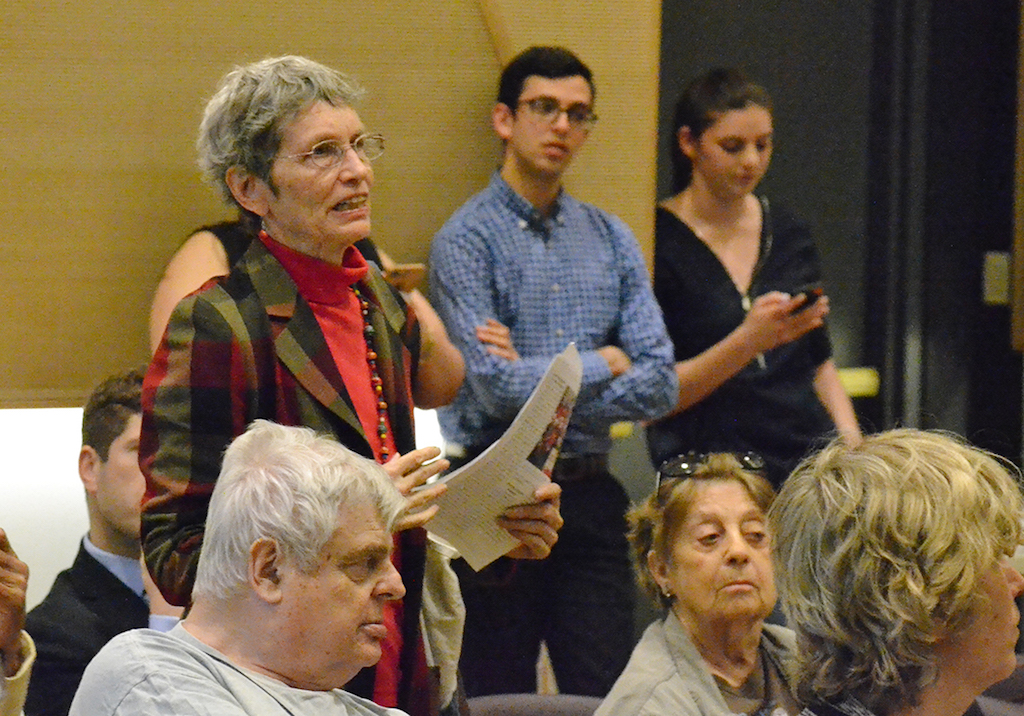
In the case of St. Vincent’s, it was privately owned by the Archdiocese of New York — not city-owned — though the city did make the decision to rezone the site for residential use.
Responding to a question about the Vision Zero plan to increase street safety, de Blasio said people will be seeing more enforcement against texting while driving and more alcohol checkpoints out there. He also said that the safety improvements on Queens Boulevard — a.k.a. “The Boulevard of Death” — “have made a difference, and there’s more to go.”
Regarding a question on the lack of full-service hospitals Downtown, de Blasio said the most important thing is to preserve emergency-room capability.
Councilmember Corey Johnson, who is running unopposed for a second term, introduced de Blasio. They showered each other with praise, de Blasio noting that Johnson was one of the first to hold an organizing meeting after the presidential election on “how to fight back” against Trump.
“Corey set the tone,” the mayor said. “Of course people were upset or freaked out,” and yet Johnson’s effort helped create “a spirit of optimism.”
“He excels on focusing on the quality-of-life things, but he also looks at the big picture,” the mayor added of the councilmember.
Johnson was so elated at the mayor’s compliments that, at one point, he actually audibly giggled with happiness.
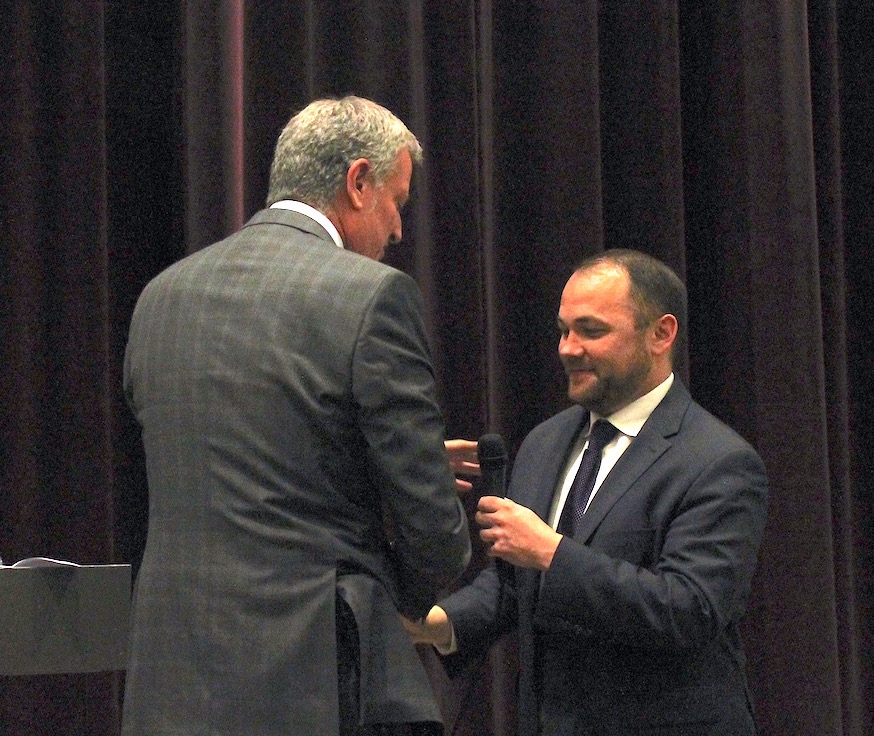
Before the mayor arrived, Johnson gave his own remarks to the political crowd.
“The last 100 days have been like daily PTSD,” he noted, referring to Trump.
In response to an audience query, he said he does support the closing of Rikers Island jail — and, in fact, would even welcome a small jail in the Village, Chelsea or Hell’s Kitchen.
“I’m supportive of a borough-based facility in this district, as long as the community is on board with it and there is consultation,” he said.
He said among the achievements he was most proud of during his past three years in office was winning designation of the final part of the South Village Historic District as part of the St. John’s Partners rezoning deal, which the crowd greeted with applause. He also noted he is firmly against the “Gansevoort Row” rebuilding and “upzoning” project in the Meatpacking District that the community has been battling in court.
On the open secret that Johnson aspires to be the next City Council speaker, Bradlow referred to — though without naming her — former Speaker Christine Quinn, who formerly represented Johnson’s Council District 3. Bradlow said that Quinn’s decisions “often worked against the district” because Quinn admittedly felt she had to take into account the broader interests of the whole city. Would Johnson be like that? she asked.
Johnson responded, “I think your first obligation as an elected official is to the people who elected you. I have 170,000 constituents.”
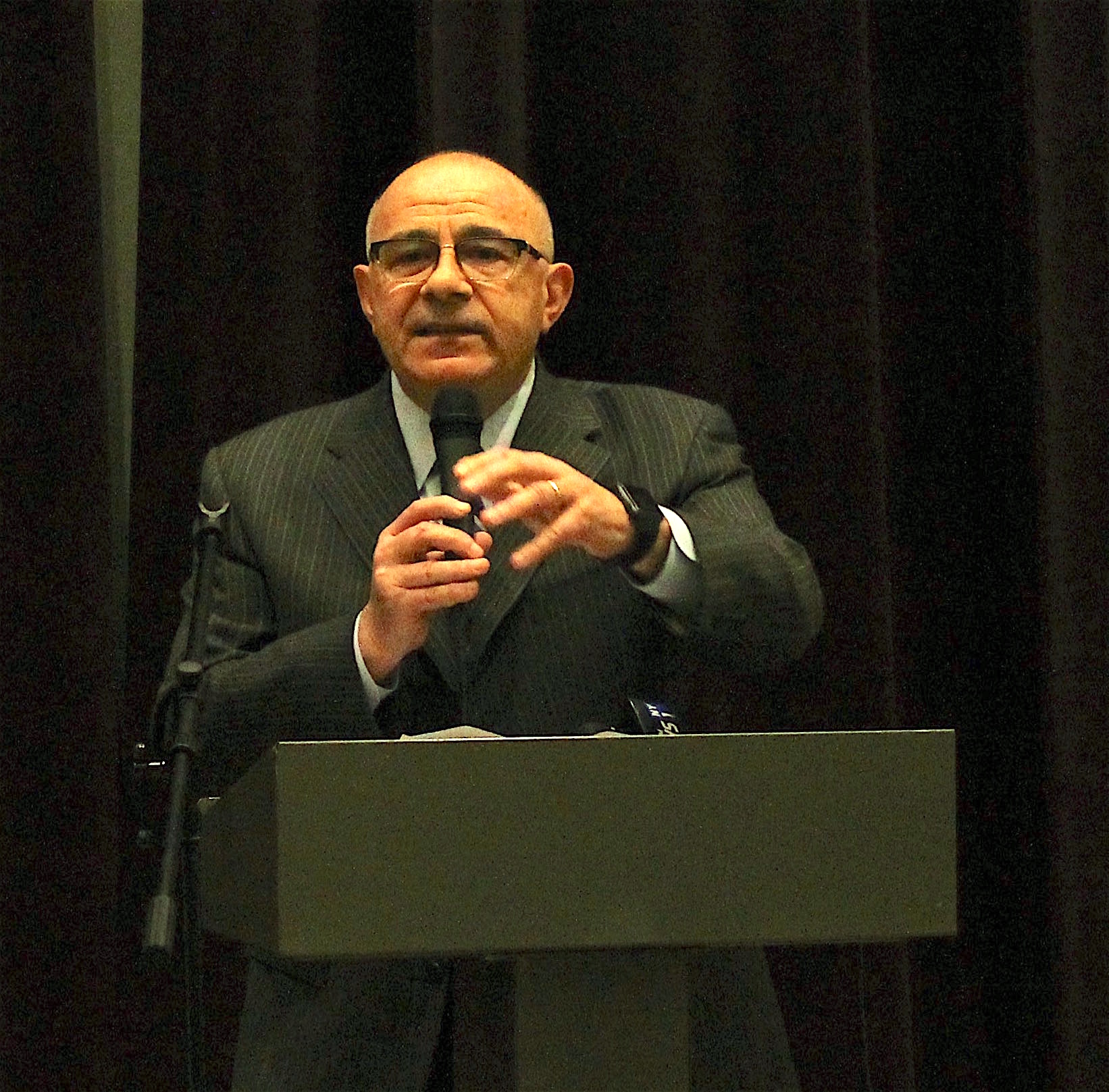
Several other candidates for mayor also spoke. Sal Albanese, the former Brooklyn councilmember, said “pay-to-play corruption is rampant” in city government. Traffic and the subways are terrible, he added.
“I’m going to be the ‘Subway Mayor,’ ” he vowed.
“The real estate in this city controls the politics,” he said. “If you look at the contributions, across the board — the politicians are owned by real estate developers.” De Blasio, he charged, “is owned lock, stock and barrel by big real estate.
“New York City should be Athens,” Albanese declared, saying that city government should aspire to cleaner ethics.
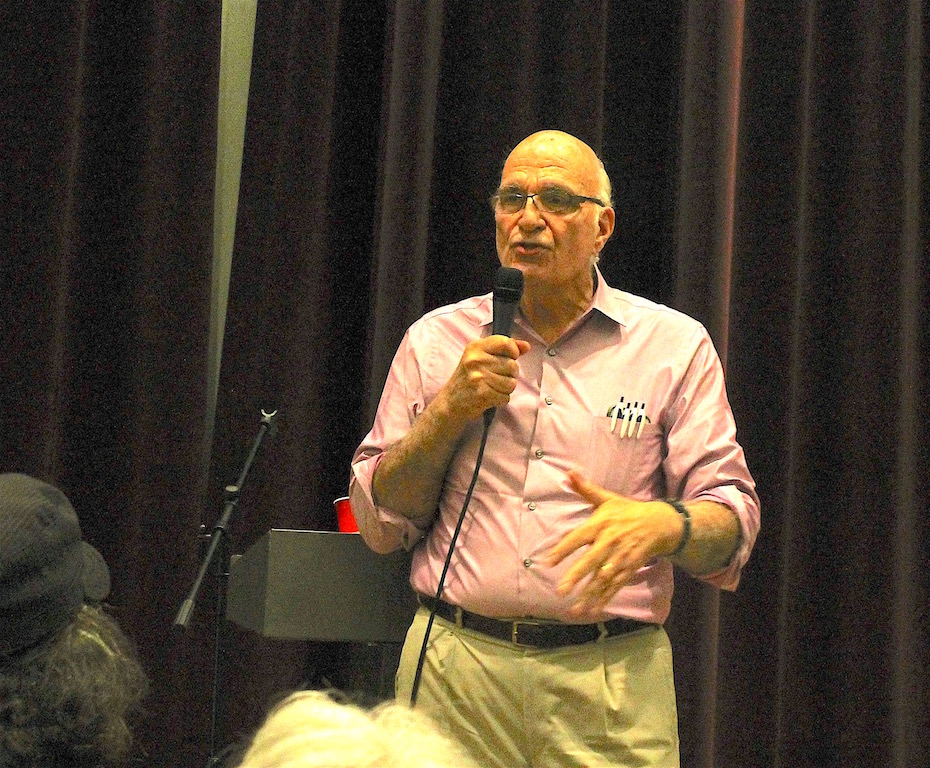
Bob Gangi, from the Upper West Side, said Rikers could be closed immediately and that there is no need to build smaller replacement jails in the boroughs. Asked how that could be done, he said most of the inmates in Rikers are not convicted, just awaiting trial, but can’t make bail. They could all simply be released, with supervision in some cases, he said.
He said de Blasio can’t call himself a progressive yet support “Broken Windows” policing since “it has been proven to be blatantly racist.”
In fact, de Blasio is a “hard-liner” on police and crime, Gangi accused, noting, “He and Jeff Sessions think ‘Broken Windows’ is good for law enforcement.”
Gangi said he supports free mass transit for low-income New Yorkers.
Candidates for public advocate, Manhattan district attorney, comptroller and borough president also spoke. Only public advocate saw more than the incumbent turn out.
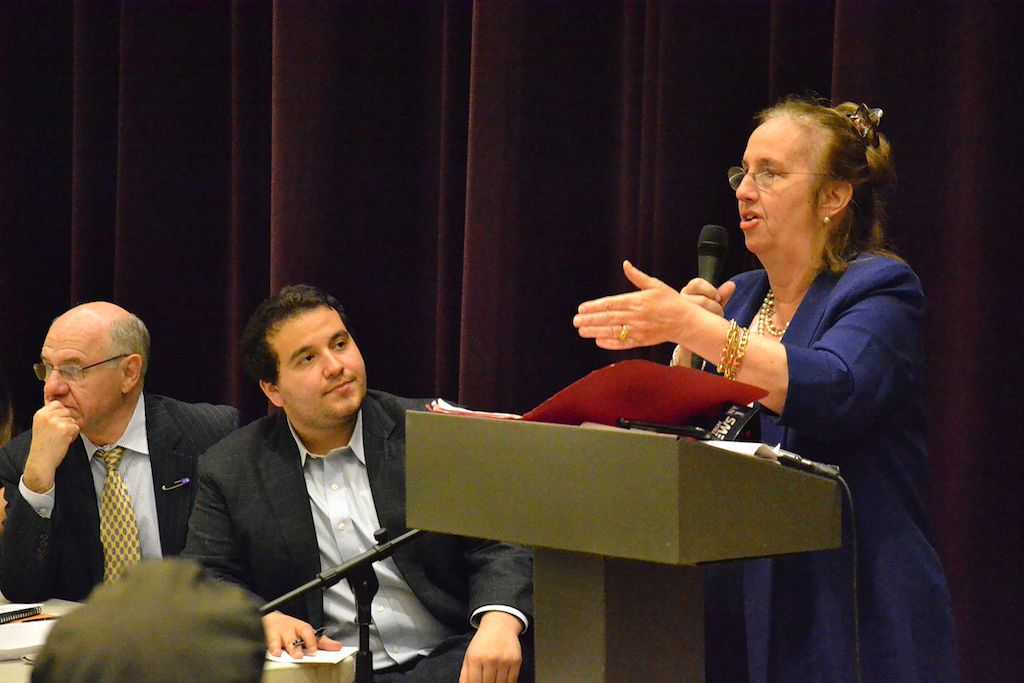
The New York Post’s report on the event, headlined, “De Blasio shows up late for Democratic candidates’ forum,” focused on the fact that the mayor showed up 15 minutes late.
However, Erik Coler, V.I.D. president, said the club was focused on the issues and substance.
“It wasn’t a big issue with us,” he said of when De Blasio arrived. “We were running behind anyway, and I think people were more concerned with what the candidates had to say.
“I thought the mayor did a fine job speaking about what he wants to do next,” Coler said. “However, I don’t think everyone in the room was happy with all of his answers, especially regarding the Elizabeth St. Garden.”
Asked if the mayor generally goes to every political club to seek its endorsement, Coler said, no.
“He does not,” he noted. “We appreciated the mayor joining our forum and speaking to our members. V.I.D. was the main sponsor. However, we had a number of clubs who co-sponsored the event with us. De Blasio realized that this was a major political roadblock he couldn’t avoid. If he wants to win Downtown, it’s necessary to work with progressive clubs like us.”
Coler said de Blasio does not have a lock on Downtown clubs’ support.
“It’s never a guarantee with V.I.D. who we are going to endorse,” he said. “Our club members go with who they feel is the most qualified elected official.”
The club will hold its discussions and endorsement votes next Thursday for mayor, district attorney, comptroller, public advocate and borough president.






